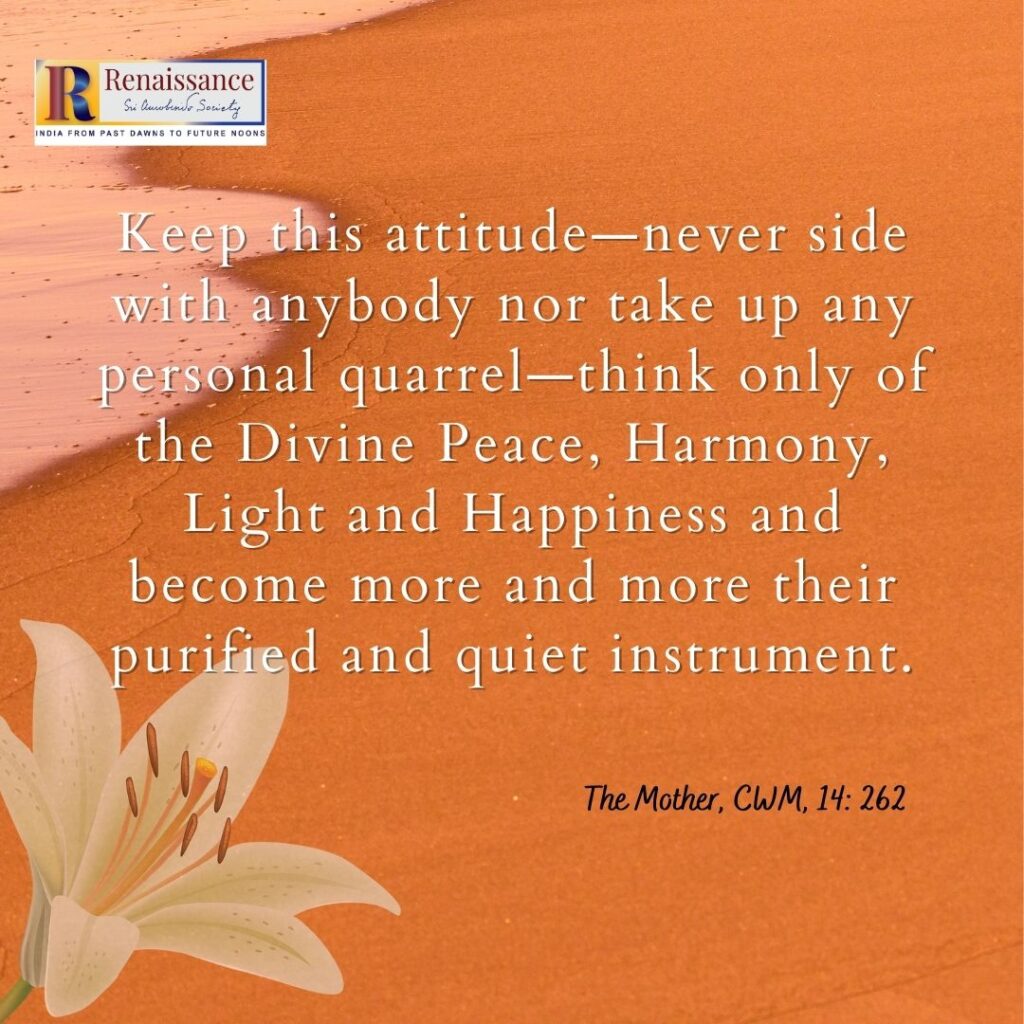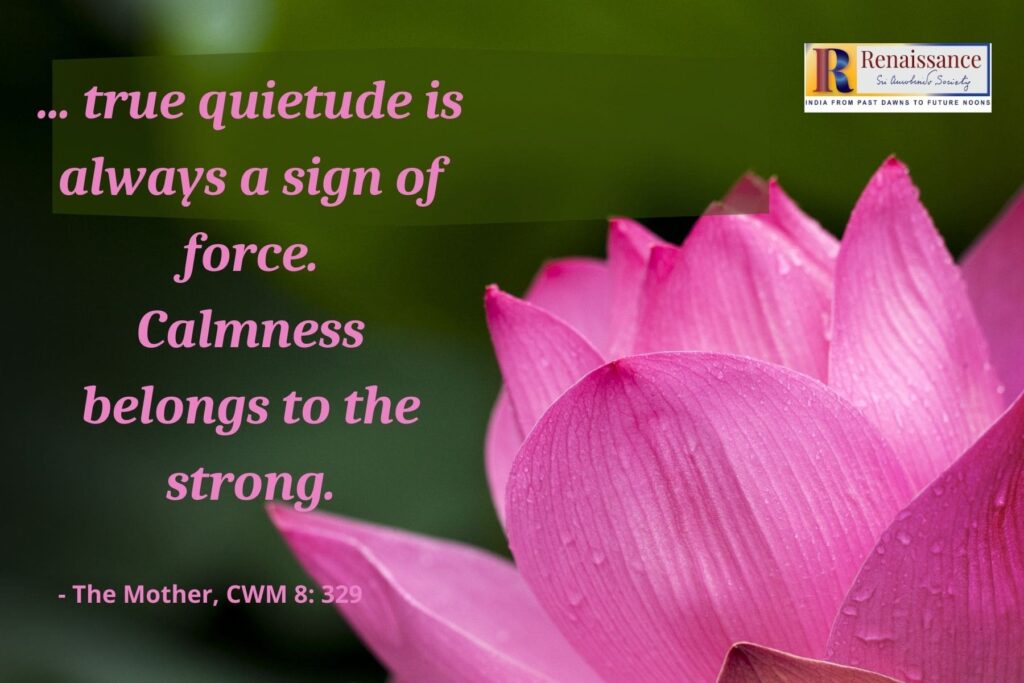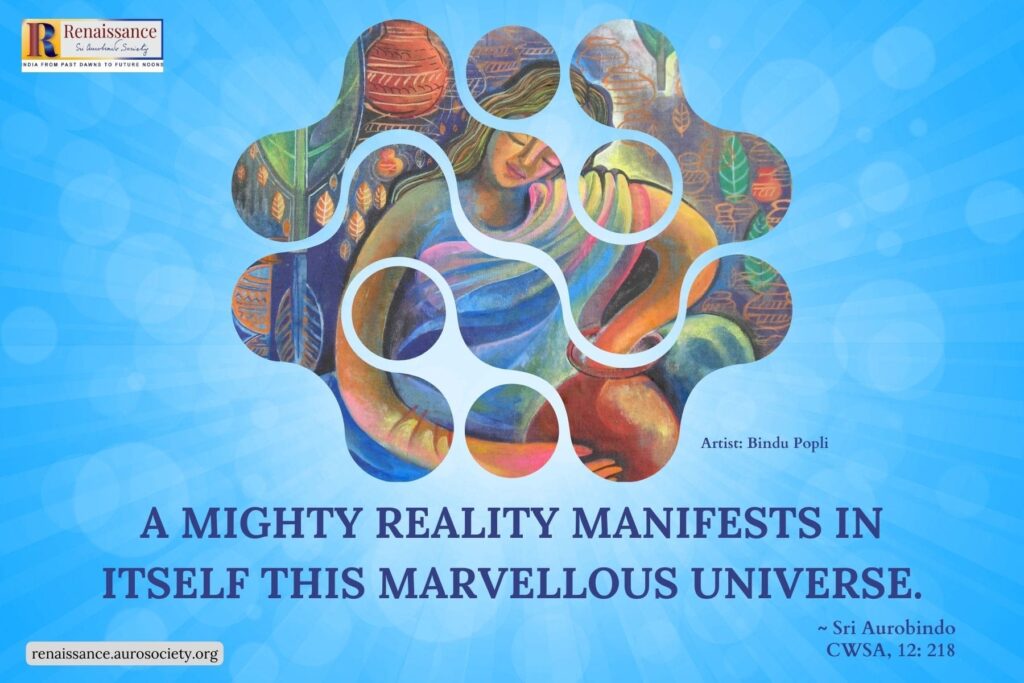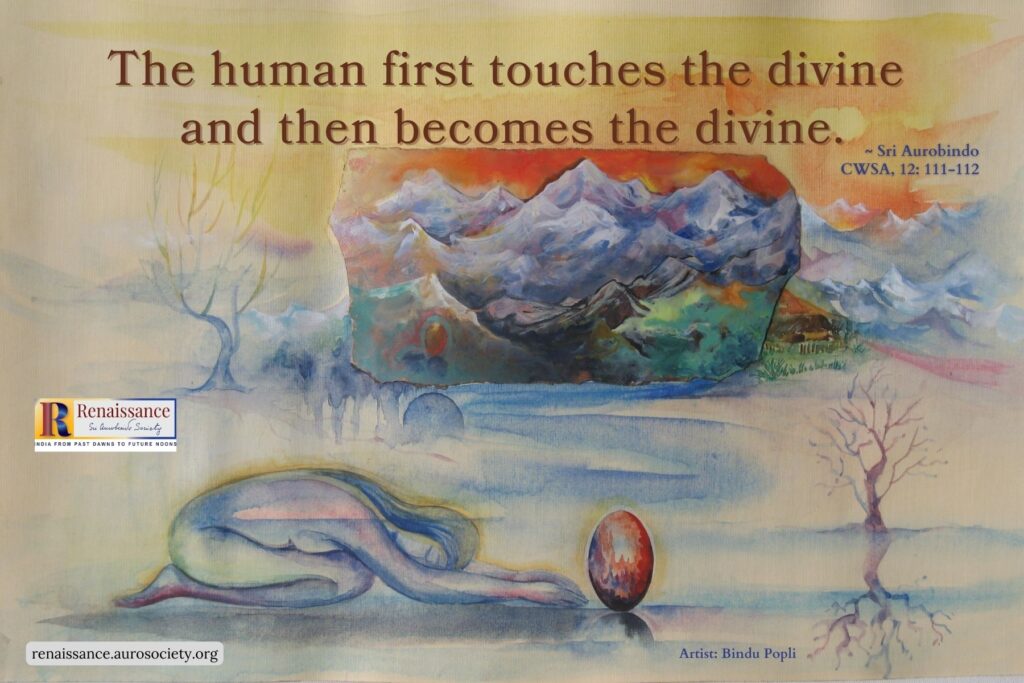Editor’s note: This feature highlights some more practical guidance for the aspirants on the Sunlit path of Integral Yoga. The Mother explains in the selected conversation the deeper meaning of being calm and its connection with inner strength. Sri Aurobindo’s letters speak of the significance of psychic development in one’s effort to conquer anger and other such lower vital imperfections.

“One must be calm.”
Someone has asked me what I meant by these words:
“One must be calm.”
It is obvious that when I tell someone, “Be calm”, I mean many different things according to the person. But the first indispensable calm is mental quietude, for generally that is the one that’s most lacking. When I tell someone, “Be calm”, I mean: Try not to have restless, excited, agitated thoughts; try to quieten your mind and to stop turning around in all your imaginations and observations and mental constructions.
One could justifiably add a question: You tell us “Be calm”, but what should we do to be calm?. . .
The answer is always more or less the same: you must first of all feel the need for it and want it, and then aspire, and then try!
For trying, there are innumerable methods which have been prescribed and attempted by many. These methods are generally long, arduous, difficult; and many people get discouraged before reaching the goal, for, the more they try, the more do their thoughts start whirling around and being restless in their heads.
For each one the method is different, but first one must feel the need, for whatever reason it may be—whether because one is tired or because one is overstrained or because one truly wants to rise beyond the state one lives in—one must first understand, feel the need of this quietude, this peace in the mind. And then, afterwards, one may try out successively all the methods, known ones and new, to attain the result.
Now, one quickly realises that there is another quietude which is necessary, and even very urgently needed—this is vital quietude, that is to say, the absence of desire.
Only, the vital when not sufficiently developed, as soon as it is told to keep quiet, either goes to sleep or goes on strike; it says, “Ah! no. Nothing doing! I won’t go any farther. If you don’t give me the sustenance I need, excitement, enthusiasm, desire, even passion, I prefer not to move and I won’t do anything any longer.”

So there the problem becomes a little more delicate and perhaps even more difficult still; for surely, to fall from excitement into inertia is very far from being a progress! One must never mistake inertia or a somnolent passivity for calm.
Quietude is a very positive state; there is a positive peace which is not the opposite of conflict—an active peace, contagious, powerful, which controls and calms, which puts everything in order, organises. It is of this I am speaking; when I tell someone, “Be calm”, I don’t mean to say “Go and sleep, be inert and passive, and don’t do anything”, far from it!…
True quietude is a very great force, a very great strength.
In fact one can say, looking at the problem from the other side, that all those who are really strong, powerful, are always very calm. It is only the weak who are agitated; as soon as one becomes truly strong, one is peaceful, calm, quiet, and one has the power of endurance to face the adverse waves which come rushing from outside in the hope of disturbing one.
This true quietude is always a sign of force. Calmness belongs to the strong.
And this is true even in the physical field. I don’t know if you have observed animals like lions, tigers, elephants, but it is a fact that when they are not in action, they are always so perfectly still.
A lion sitting and looking at you always seems to be telling you, “Oh, how fidgety you are!” It looks at you with such a peaceful air of wisdom! And all its power, energy, physical strength are there, gathered, collected, concentrated and―without a shadow of agitation―ready for action when the order is given.
I have seen people, many people, who could not sit still for half an hour without fidgeting. They had to move a foot or a leg, or an arm or their head; they had to stir restlessly all the time, for they did not have the power or the strength to remain quiet.
This capacity to remain still when one wants to, to gather all one’s energies and spend them as one wishes, completely if one wants, or to apportion them as one wants in action, with a perfect calm even in action—that is always the sign of strength. It may be physical strength or vital strength or mental strength.
But if you are in the least agitated, you may be sure there is a weakness somewhere; and if your restlessness is integral, it is an integral weakness.
So, if I tell someone “Be calm”, I may be telling him all kinds of things, it depends upon each person. But obviously, most often it is, “Make your mind quiet, don’t be restless all the time in your head, don’t stir up lots of ideas, calm yourself.”
~ The Mother, Questions and Answers (1956): 17 October 1956

Read more practical guidance:
Peace in the Mind and Having a Peaceful Sleep


Of Anger, Peace and Psychic
That [inner detachment] is the right thing that must happen always when anger or anything else rises. The psychic reply must become habitual pointing out that anger is neither right nor helpful and then the being must draw back from these outward things and take its stand in its inner self, detach from all these things and people.
It is this detachment that is the first thing that must be gained by the sadhak—he must cease to live in these outward things and live in his inner being. The more that is done the more there is a release and peacefulness. Afterwards when one is secure in this inner being, the right thing to do, the right way to deal with men and things will begin to come.
***
It is true that anger and strife are in the nature of the human vital and do not go easily; but what is important is to have the will to change and the clear perception that these things must go. If that will and perception are there, then in the end they will go.
The most important help to it is, here also, for the psychic being to grow within—for that brings a certain kindliness, patience, charity towards all and one no longer regards everything from the point of view of one’s own ego and its pain or pleasure, likings and dislikings.
The second help is the growth of the inner peace which outward things cannot trouble. With the peace comes a calm wideness in which one perceives all as one self, all beings as the children of the Mother and the Mother dwelling in oneself and in all.
It is that towards which your sadhana will move, for these are the things which come with the growth of the psychic and spiritual consciousness. Then these troubled reactions to outward things will no longer come.
***
It is indeed when the quietude comes down from above or comes out from the psychic that the vital becomes full of peace or of kindliness and goodwill. It is therefore that the inner psychic quietude first and afterwards the peace from above must occupy the whole being.
Otherwise such things as anger in the vital can be controlled but it is difficult to get rid of them altogether without this occupation by the inner quietude and higher peace. That you should depend on the Mother for the sadhana is the best attitude, for it is indeed her Force that does the sadhana in you.
~ Sri Aurobindo, CWSA, Vol. 31, pp. 275-276
***

When it is the psychic that rules all the movements of the being, then it [anger] completely disappears and when the equanimity of the higher consciousness takes complete possession of the lower vital. Till then one can establish a control, diminish and reduce it to a touch that has no outward effect or a wave that passes without self-expression.
~ Sri Aurobindo, CWSA, Vol. 31, pp. 274-275
Be Aware of the Contagion
Each one has around him an atmosphere made of the vibrations that come from his character, his mood, his way of thinking, feeling, acting. These atmospheres act and react on each other by contagion; the vibrations are contagious; that is to say, we readily pick up the vibration of someone we meet, especially if that vibration is at all strong.
So it is easy to understand that someone who carries in and around himself peace and goodwill, will in a way impose on others at least something of his peace and goodwill, whereas scorn, irritability and anger will arouse similar movements in others.
~ The Mother, CWM, Vol. 16. p. 32

~ Design: Raamkumar and Beloo Mehra



